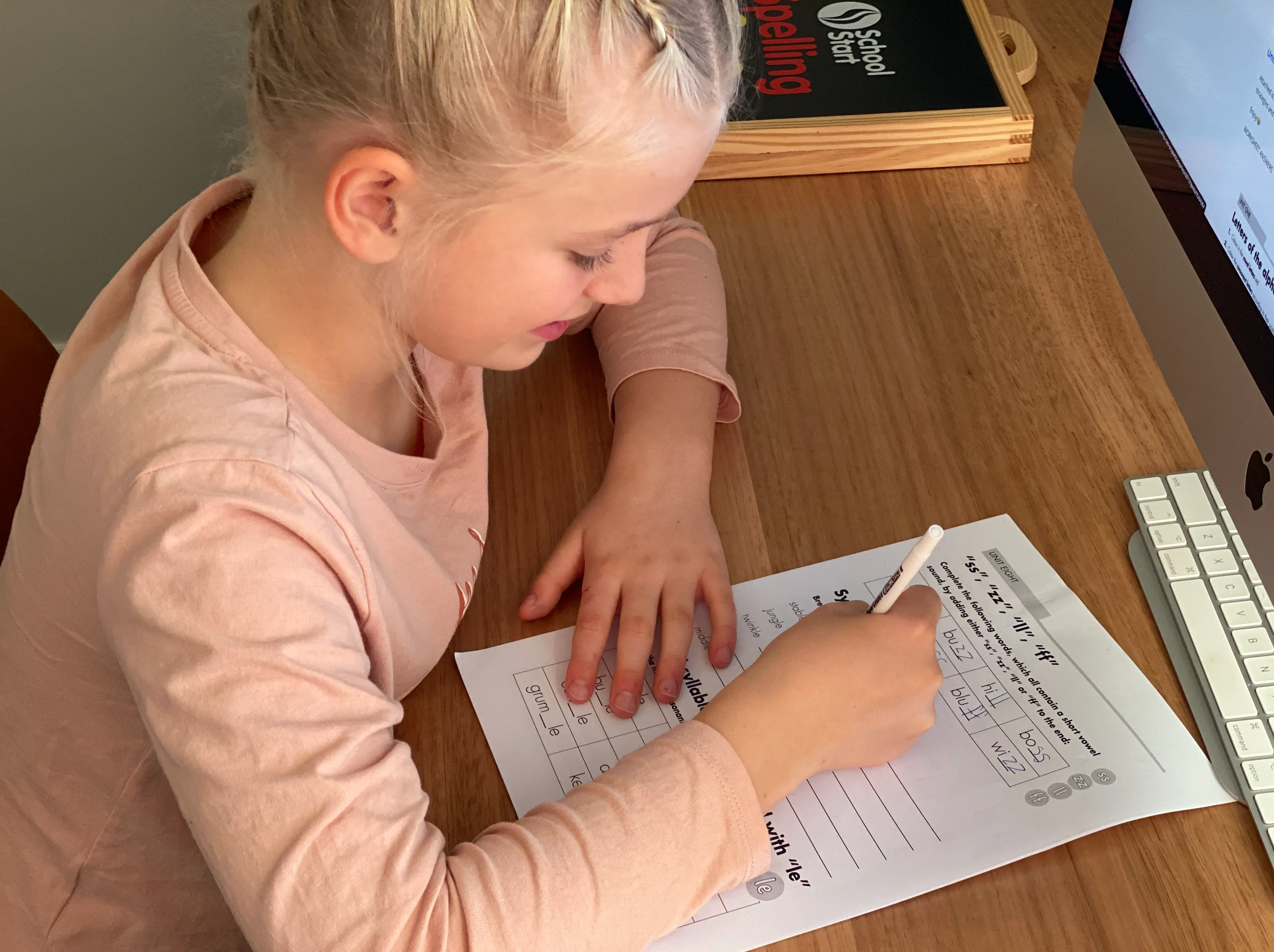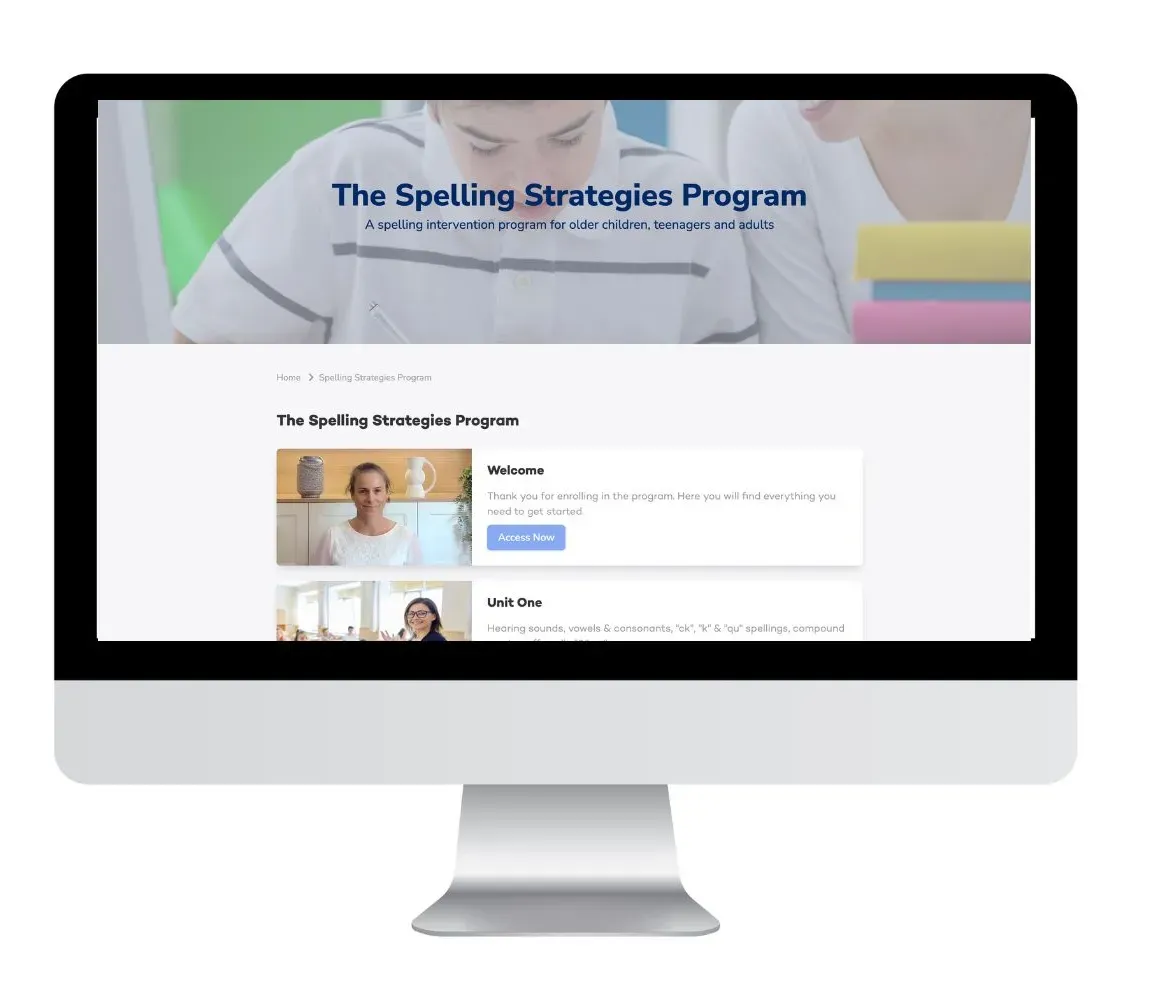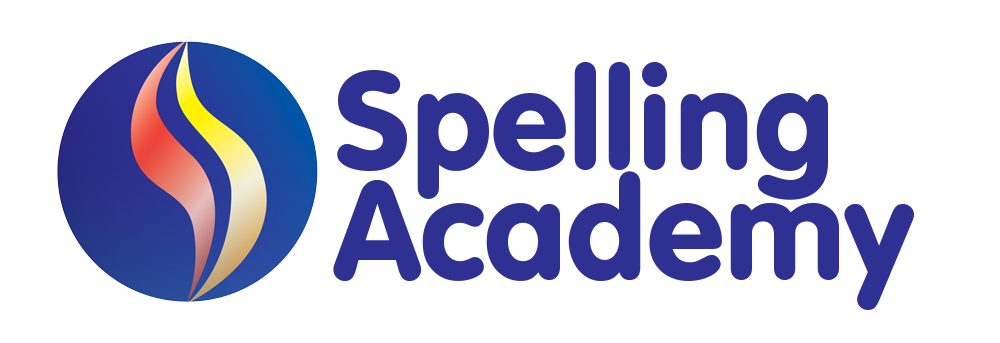Elevate spelling proficiency with our specialised online spelling program for older children, teenagers and adults who find spelling challenging. The Spelling Strategies Program is thoughtfully designed to empower anyone, be it a teacher or parent, in providing effective support to children struggling with spelling.
Spelling poses a challenge for a variety of reasons, but a common factor is the lack of understanding about how to use effective spelling strategies. Often, individuals grappling with spelling difficulties tend to rely solely on writing the sounds they hear (often without possessing strong phonemic awareness skills), restricting their ability to spell a broad range of words.
According to the Australian Curriculum, the systematic teaching of english spelling strategies is recommended until approximately Grade Five. However, a significant number of children are not fully acquiring proficient spelling skills by this stage. Unfortunately, as spelling tends to receive less emphasis in the latter years of schooling, these individuals might miss the opportunity to develop confident spelling abilities.
The Spelling Strategies Program caters for this common learning need by providing targeted spelling training, ensuring mastery of essential spelling strategies and rules. We firmly believe that no child should leave school with poor spelling skills. Moreover, we are committed to extending this opportunity to learners of all ages, recognising the importance of acquiring these fundamental spelling skills.
Comprising a total of 15 units, each segment within our program follows a consistent six-step structure, ensuring a seamless teaching and learning experience. We use the word “instructor” rather than “teacher” because, even though the program can be used in schools, you don’t need to be a teacher to run the program. We also use the word “learner” rather than “child” because an adult with poor spelling skills would also benefit from this program. The sequential steps for each unit are detailed below:
Start each unit with an engaging pre-recorded video lesson where the focus spelling strategies for that unit are taught. Learners use a whiteboard and marker to participate in the video lesson. The instructor (maybe a parent or a teacher) simply presses "pause" when prompted in the lesson, and offers support when the learner needs it. If you don't feel confident with spelling yourself, these lessons are an invaluable opportuity to learn how to spell together!

Each video lesson in the program is supported and strengthened with a printable workbook for learners to complete. These thoughtfully designed worksheets are not only a great way to reinforce learning, but can also be used to monitor the learner's understanding of the concepts being taught. The instructor simply oversees the completion of the workbooklet and uses any errors made by the learner as a teaching opportunity.

Children who are poor spellers must learn how to spell the most commonly used words in our English language so that they can confidently complete daily writing tasks. This is why each unit has a small list of 10 commonly written words that learners are tested on and then provided with a research-based process to learn any words they are unable to spell. All ten words are included in the dictation sentences (step 6) to make sure learning is retained.

Research tells us that discussion about the process of spelling words helps us learn how to spell better. Also, people learn best when they understand what they are learning and how it will improve their spelling. This step incorporates both these theories.
First, the learner reads the focus spelling strategy from the front of their workbook. Next the instructor locates the corresponding strategy in their instructor's manual and reads the words from the list. The learner uses spelling strategies to write each word onto their whiteboard and then explains what strategies they are using. Since both the learner and the instructor have watched the video lesson, you should be using the same 'language' to describe the spelling strategies. In this step, the learner assesses their own learning progress.
The online quizzes are a fun and effective way to finish each unit and a great way to monitor progress. The online quiz can be completed as a whole group to facilitate discussion about words, or learners can complete the quizzes independently.

Each unit concludes with a dictation activity where students apply all of the spelling strategies and commonly written words they have learnt to write short sentences. This reinforces the systematic structure of the program, where spelling skills are taught and reinforced in a strategic approach. It is common for children who have spelling difficulties to also have writing difficulties. Dictation is a proven way to improve writing skills. It involves the facilitator reading aloud a sentence for the learner to orally repeat until they have memorised the whole sentence. The learner then writes the sentence applying essential writing skills, like: handwriting, spelling, fluency, punctuation and editing. The instructor can use the completed sentences to determine if the learner is ready to move onto the next unit of the program, or if they need more practise with step 1 - 5.
This Is A Limited Time Offer

15 online video lessons.
Downloadable workbooks that support each video lesson.
Downloadable Instructor's Manual.
Word lists that support each video lesson.
Online quizzes that support each video lesson.
150 comonly written words with researched-based learning activities.
Dictation sentences that support systematic learning.
Fully supported learning with direct access to the author.
Ongoing learning for the instructor throughout the program.
Immediate access to the entire Spelling Strategies Program for a full year.
Full Price:
$695
Your transactions are 100% secured. We use the best possible encryption method available.
Learn five key components that will improve someone's spelling.
Take the first step to improving a child's spelling today!
I hated writing because spelling just didn't make sense to me. Now I feel so much more confident with writing because I now use strategies and rules to help me.
I did a spelling test at the start of term and got 41%. I completed The Spelling Strategies Program in one term and I've just done the same test again (at the end of the term) and got 71%
I'm going through the Spelling Strategies Program with my boy and it's fantastic. I write for a living and I've even learnt a few things. I guess I've always known the how (to spell words) but now I know the why (words are spelled that way). It's been enlightening!
Words never made sense to me because they aren't always spelt the way they sound. Now that I understand rules and how to see meaningful parts of words, spelling makes sense to me.

Helping people to understand and feel confident with spelling.
© 2021 spellingacademy.com.au. All Rights Reserved.